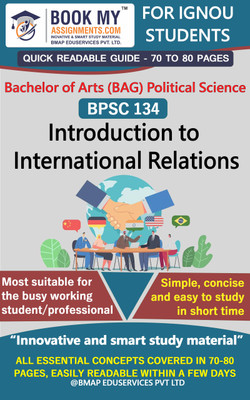IGNOU BPSC 134 Introduction to International Relations Quick Readable Notes Book For Ignou Student(Paperback, BMA Publication)
Quick Overview
Product Price Comparison
IGNOU BPSC 134 (Introduction to International Relations) involves condensing key concepts, theories, and methodologies related to international relations. Here's a structured approach to help you create your own notes:Introduction to International Relations:Definition: Study of interactions among states, non-state actors, and international institutions.Importance: Understanding global politics, security, economics, and diplomacy.Key Concepts:Sovereignty: State's supreme authority within its territory.Power: Ability to influence outcomes and behavior.Security: Protection from external threats.Diplomacy: Negotiation and communication between states.Globalization: Increasing interconnectedness and interdependence.Theoretical Approaches:Realism: Focus on power, security, and state interests.Liberalism: Emphasizes cooperation, institutions, and international law.Constructivism: Importance of ideas, norms, and identities.Marxism: Views international relations through class struggle and economic factors.Feminism: Analyzes gender dynamics and inequalities in global politics.International System:Types: Unipolar, bipolar, multipolar.Structure: Distribution of power among states.Dynamics: Changes over time, rise and fall of powers.Actors in International Relations:States: Primary actors with sovereignty and international recognition.Non-State Actors: NGOs, multinational corporations, terrorist groups.International Institutions: UN, WTO, IMF, regional organizations.International Security:Traditional Security: Military capabilities, alliances, conflicts.Non-Traditional Security: Terrorism, cyber threats, climate change, pandemics.International Political Economy:Trade: Globalization of markets, trade agreements, protectionism.Finance: International monetary system, IMF, World Bank.Development: Aid, poverty reduction, sustainable development goals.Diplomacy and Foreign Policy:Bilateral and Multilateral Diplomacy: State interactions at various levels.Foreign Policy Analysis: Decision-making processes, national interests, and strategies.


